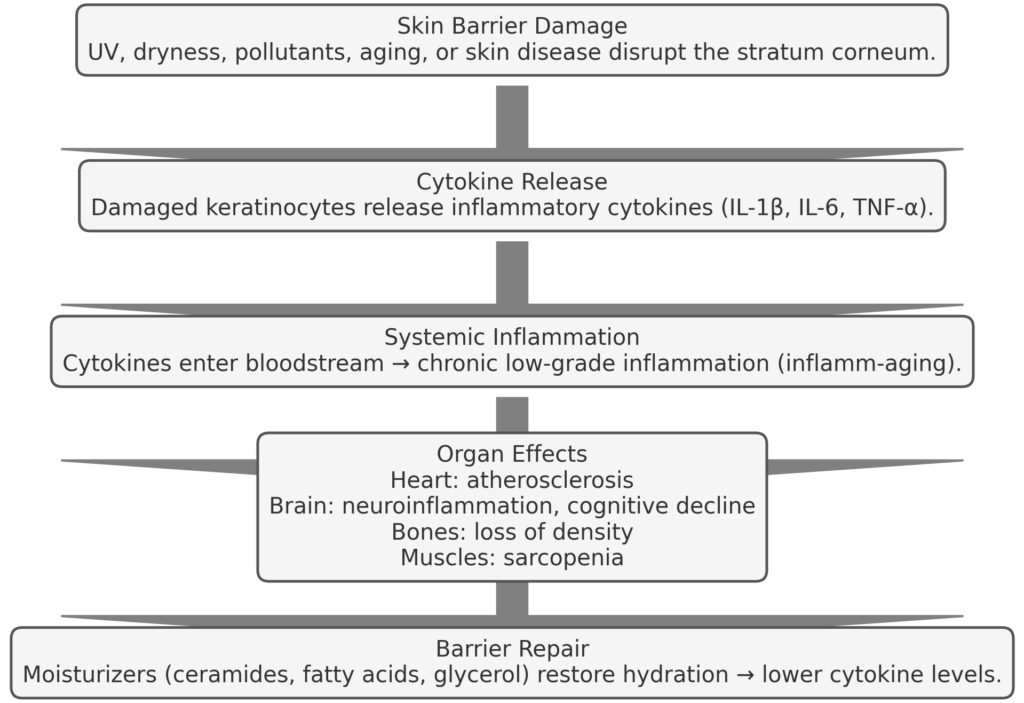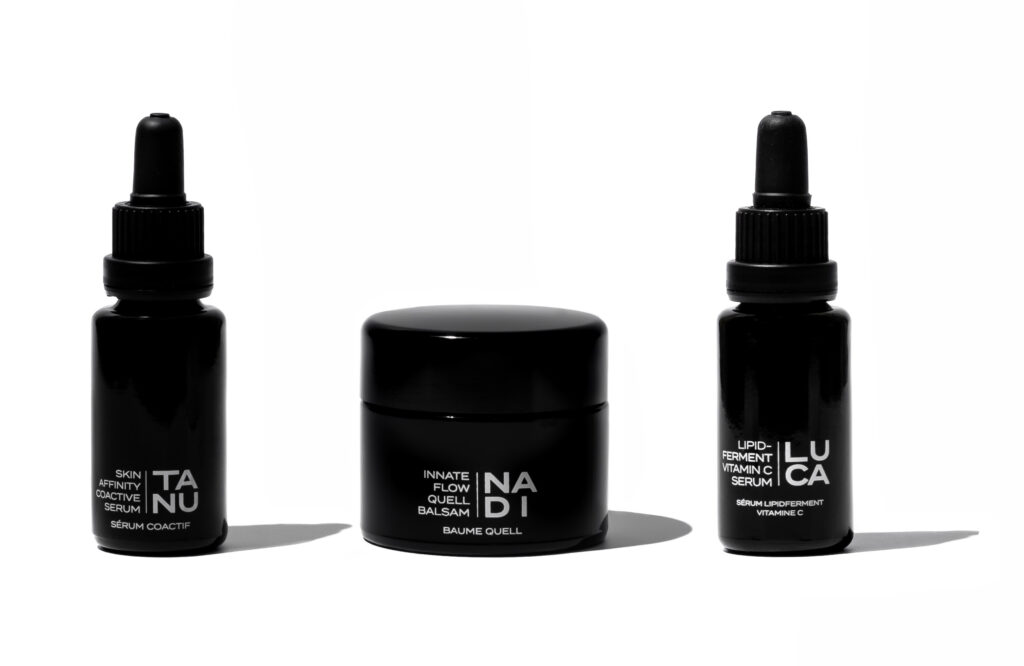This article explores the emerging scientific consensus that the condition of our skin directly influences our overall health and longevity — we go far beyond aesthetics and investigate why your skin is your health regulator, not just a barrier.
Skin as a Health Regulator
New evidence shows that even mild deterioration of the health of the skin can trigger systemic inflammation, affect organs like the brain, heart, and bones, and potentially accelerate aging throughout the body. Our skin is essential for life, forming a waterproof barrier that preserves internal balance. When that barrier is compromised — even slightly — the consequences may reach far beyond the skin itself.
Inflammation: The Skin’s Link to Systemic Disease
Researchers like Theodora Mauro and Peter Elias (University of California, San Francisco) have shown that skin inflammation — especially from chronic conditions such as psoriasis and atopic dermatitis (eczema) — can drive the same inflammatory processes seen in heart disease, diabetes, muscle wasting (sarcopenia), and dementia.
A 2018 meta-analysis found that atopic dermatitis was linked to a small but significant increase in cardiovascular risk (heart attack, stroke, heart failure).
Similar findings exist for psoriasis, where long-term inflammation raises cardiovascular risk and contributes to muscle loss.
Cytokines and “Inflammaging”
When the skin barrier is damaged, cells release cytokines, chemical messengers that activate the immune system. This inflammation is meant to be temporary, but in chronic skin conditions it persists, leaking inflammatory molecules into circulation — the same cytokines that increase with age-related chronic inflammation (“inflammaging”).
In a 2023 human study (255 adults aged 65+), lower skin hydration correlated with higher blood cytokine levels, suggesting that age-related skin dryness can drive systemic inflammation.

Skin Systemic Inflammation Pathway
Systemic Consequences of Skin Damage
There is a growing body of evidence that skin dysfunction can impact multiple organs:
- Gut: Research by Richard Gallo (UC San Diego, 2021) found that inflamed skin releases hyaluronan, which travels to the gut and provokes immune reactions linked to inflammatory bowel disease.
- Bones: A 2022 study (Wenquan Liang, Southern Medical University) showed that aged or damaged skin in mice led to bone loss because it produced less cystatin-A, a protein that supports healthy bone remodelling. Restoring cystatin-A via topical treatment prevented bone thinning.
- Brain: Consistent associations between inflammatory skin diseases and cognitive decline or Alzheimer’s disease, supporting the hypothesis that skin inflammation may influence brain aging.
- Environment: Aging or weakened skin barriers also allow more pollutants and toxins to penetrate. After the 2018 California wildfires, dermatology clinics saw worsened eczema symptoms in those exposed to smoke, confirming that barrier weakness increases vulnerability.
The Skin Microbiome: An Invisible Partner
Known as the skin’s ecosystem, the microbiome consists of about a thousand species of bacteria, fungi, and viruses, and plays a major role in immune health and barrier stability. The skin supports a diverse community of microorganisms that train and support the immune system and fend off external pathogenic threats.
Researchers have uncovered evidence of extensive communication between bacteria, skin cells and immune cells. These interactions help to reinforce and repair the barrier formed by the skin, strengthen the body’s defences against infection and reduce excess inflammation.
Staphylococcus aureus, a common skin bacterium that becomes pathogenic when skin immunity weakens (e.g., in eczema). A loss of beneficial microbes like Staphylococcus hominis allows S. aureus to proliferate, worsening inflammation and contributing to systemic immune activation. This reveals a skin–immune feedback loop, where microbial imbalance can escalate skin disease and amplify body-wide inflammation.
The Overlooked Function of Skin
The skin has a sensory role in both mental and physical well-being. A 2023 meta-review (Julian Packheiser, Netherlands Institute for Neuroscience) found that touch reduces anxiety and depression, lowers cortisol, and decreases heart rate.
Physical contact supports healthy development in infants, while deprivation impairs growth and emotional health. This underscores that skin’s influence extends into the nervous system and psychological resilience.
How Can Skincare Improve Overall Health
Chronic skin damage or neglect contributes to systemic inflammation — fuelling heart disease, bone loss, cognitive decline, and immune dysfunction. Incorporating skincare products formulated to protect and defend the skin by supporting skin integrity through hydration, barrier repair, and microbial balance may mitigate aging and disease across multiple organs. Taking care of your skin might help you live not just longer, but healthier.
- 2019 UCSF/Guangzhou pilot study: 33 older adults used a lipid-rich cream (cholesterol, fatty acids, ceramides) for 30 days. Results: improved barrier hydration and reduced circulating cytokines.
- 2022 three-year trial (200 participants, China): daily application of the same cream stabilised cognitive scores and reduced skin water loss compared to untreated controls.
Practical Skincare Tips
- Use “barrier-repair” moisturisers containing ceramides, fatty acids, cholesterol, and humectants.
- Maintain balanced sun exposure to support vitamin D production without causing UV damage.
- Manage chronic skin conditions early to reduce systemic inflammatory burden.
- Support the skin microbiome through gentle cleansing and avoiding overuse of antibacterial products.
- All FIFTY7KIND products are formulated to support and promote skin health and longevity

Skin Barrier humectants are skincare ingredients that draw moisture from the air and deeper layers of the skin to the outermost layer, keeping skin hydrated and supple. Below is a list of humectants often found in skincare products:
- Glycerin: One of the most popular and cost-effective humectants used in a wide variety of products.
- Snow Mushroom: A natural, powerful hydrator that can hold large amounts of water.
- Aloe Vera: A natural ingredient known for its soothing and hydrating properties.
- Propylene Glycol: A common synthetic humectant used to help other ingredients penetrate the skin.
- Honey: A natural humectant that also has other beneficial properties for the skin.
- Panthenol: A form of vitamin B5 that helps to hydrate and soothe the skin.
- Butylene Glycol: synthesised from plant-based sources like corn sugar through fermentation often used for its skin-conditioning properties.
Until next time, be human, be kind, be you

REFERENCES
- The skin microbiome Nature 588, S209 (2020) doi: https://doi.org/10.1038/d41586-020-03523-7
- Commensal Staphylococcus epidermidis contributes to skin barrier homeostasis by generating protective ceramides. Zheng Y, Hunt RL, Villaruz AE, Fisher EL, Liu R, Liu Q, Cheung GYC, Li M, Otto M. Cell Host Microbe. 2022 Feb 1:S1931-3128(22)00040-3. doi: 10.1016/j.chom.2022.01.004. Online ahead of print. PMID: 35123653.
- Skin Repair Reduces ‘Inflamm-Aging’ Factors Linked to Chronic Disease
https://www.ucsf.edu/news/2019/03/413576/skin-repair-eliminates-inflamm-aging-linked-chronic-disease - Epidermal Penetration Increases with Age and May Contribute to Systemic Inflammation
https://www.sciencedirect.com/science/article/pii/S0022202X24030483 - The role of ceramides in skin barrier function and the importance of their correct formulation for skincare applications
https://pubmed.ncbi.nlm.nih.gov/39113291/ - A topical emollient mitigates the progression of cognitive impairment in the elderly: a randomized, open-label pilot trial
https://onlinelibrary.wiley.com/doi/abs/10.1111/jdv.18162#:~:text=Over%20the%20three%2Dyear%20trial,to%20validate%20the%20present%20results - The link between cutaneous inflammation and cognitive impairment
https://pubmed.ncbi.nlm.nih.gov/35748522/
Comments +